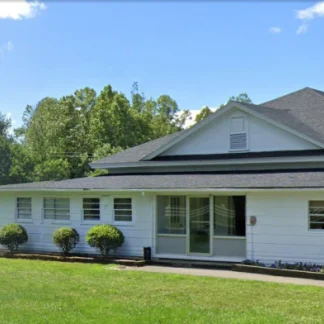Hope Valley - Men's Division
Dobson, North Carolina, 105 County Home Road, 27017
Available Programs
- Adult program
- Program for men
- Total beds : 20
- Young adult program
Insurance and Financial
- Self-pay options
- Monthly : $3,500
About this Facility
Hope Valley Men’s Division is a residential alcohol and drug addiction treatment center located in Dobson, North Carolina. They focus on the foundational tools of the 12 Steps and evidence based clinical approaches to treat addiction and dual diagnosis.
Hope Valley Men’s Division offers residential treatment services.
The residential treatment program at Hope Valley- Men’s Division is a highly structured environment that provides foundational tools and treatment at the initial stages of treatment. This program generally lasts for 28 days and encourages men through a person centered approach to treatment. Cognitive behavioral therapy, 12 Step facilitation, motivational interviewing, and relapse prevention are important elements of this process. Through private counseling, group therapy, lectures, and support groups, participants receive treatment daily. Twice monthly Hope Valley offers a family program that seeks to improve and develop healthy relationships and serve as an education centered time for the family.
Hope Valley- Men’s Division offers family education twice monthly. Through research based literature and group discussion, they hope to remove the stigma surrounding addiction and serve as a healthy space for families to heal.
Individual therapy creates the space to explore the psychological challenges associated with the addiction. With the help of a professional, individuals are given the space and direction to talk about and process their emotions. Often this includes unresolved trauma, anger, depression, anxiety, and the need for more control or autonomy in life.
Group therapy involves treatment through the process of connecting in a group setting to discuss and work through mental, emotional, and physical issues. There are a number of different group therapy modalities, including support groups, experiential therapy, psychoeducation, and more.
The 12 Step program is a common recovery model based on Alcoholics Anonymous (AA). Beginning steps involve admitting powerlessness over the addiction and creating a plan for recovery based in a Higher Power. Middle steps include self examination and making amends to those who’ve been hurt by the addiction. The later steps include continuing to take personal inventory while living a life of recovery and supporting others in doing the same. Additional 12 Step groups include Narcotics Anonymous (NA), Cocaine Anonymous (CA), Dual Recovery Anonymous (DRA), Sex and Love Addicts Anonymous (SLAA) Gamblers Anonymous (GA), to name a few.
Contact us for more information: (336) 386-8511

Contact Hope Valley - Men's Division
Connect with Hope Valley - Men's Division by calling their admissions team directly.
(336) 386-8511 Website Get Directions